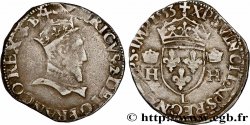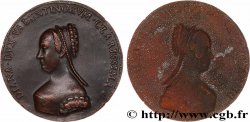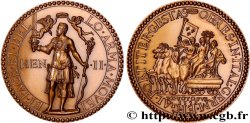fme_412190 - HENRY II Médaille d’Henri II et Catherine de Médicis
Not available.
Item sold on our e-shop (2017)
Price : 90.00 €
Item sold on our e-shop (2017)
Price : 90.00 €
Type : Médaille d’Henri II et Catherine de Médicis
Date: 1555
Mint name / Town : France
Metal : bronze
Diameter : 59,5 mm
Orientation dies : 12 h.
Weight : 103 g.
Edge : lisse + corne BRONZE
Coments on the condition:
Médaille moderne en état neuf, avec une agréable patine
Obverse
Obverse legend : HENRICVS II D. G. FRANCORVM. ET NAV. REX.
Obverse description : Buste lauré et cuirassé de Henri IV à droite.
Reverse
Reverse legend : KATHARINA DE MÉDICIS RÉGINA FRANCORVM 1555.
Reverse description : Buste à gauche de Catherine de Médicis.
Commentary
Médaille frappée depuis 1880, avec le poinçon corne d’abondance.
Henri II, né le 31 mars 1519 à Saint-Germain-en-Laye et mort le 10 juillet 1559 à Paris, est roi de France de 1547 à sa mort. Deuxième fils de François Ier et de Claude de France, il devient l'héritier du trône à la mort de son frère aîné en 1536. Il reçoit alors les titres de dauphin et de duc de Bretagne.
Il épouse le 28 octobre 1533 Catherine de Médicis, fille de Laurent II de Médicis, unique héritière de ses biens et nièce de Léon X, mais son cœur reste voué à sa confidente et préceptrice depuis l'âge de 15 ans Diane de Poitiers (avec qui il semble n'entretenir un adultère qu'après 1538 seulement)..
Henri II, né le 31 mars 1519 à Saint-Germain-en-Laye et mort le 10 juillet 1559 à Paris, est roi de France de 1547 à sa mort. Deuxième fils de François Ier et de Claude de France, il devient l'héritier du trône à la mort de son frère aîné en 1536. Il reçoit alors les titres de dauphin et de duc de Bretagne.
Il épouse le 28 octobre 1533 Catherine de Médicis, fille de Laurent II de Médicis, unique héritière de ses biens et nièce de Léon X, mais son cœur reste voué à sa confidente et préceptrice depuis l'âge de 15 ans Diane de Poitiers (avec qui il semble n'entretenir un adultère qu'après 1538 seulement)..








 Report a mistake
Report a mistake Print the page
Print the page Share my selection
Share my selection Ask a question
Ask a question Consign / sell
Consign / sell
 Full data
Full data



